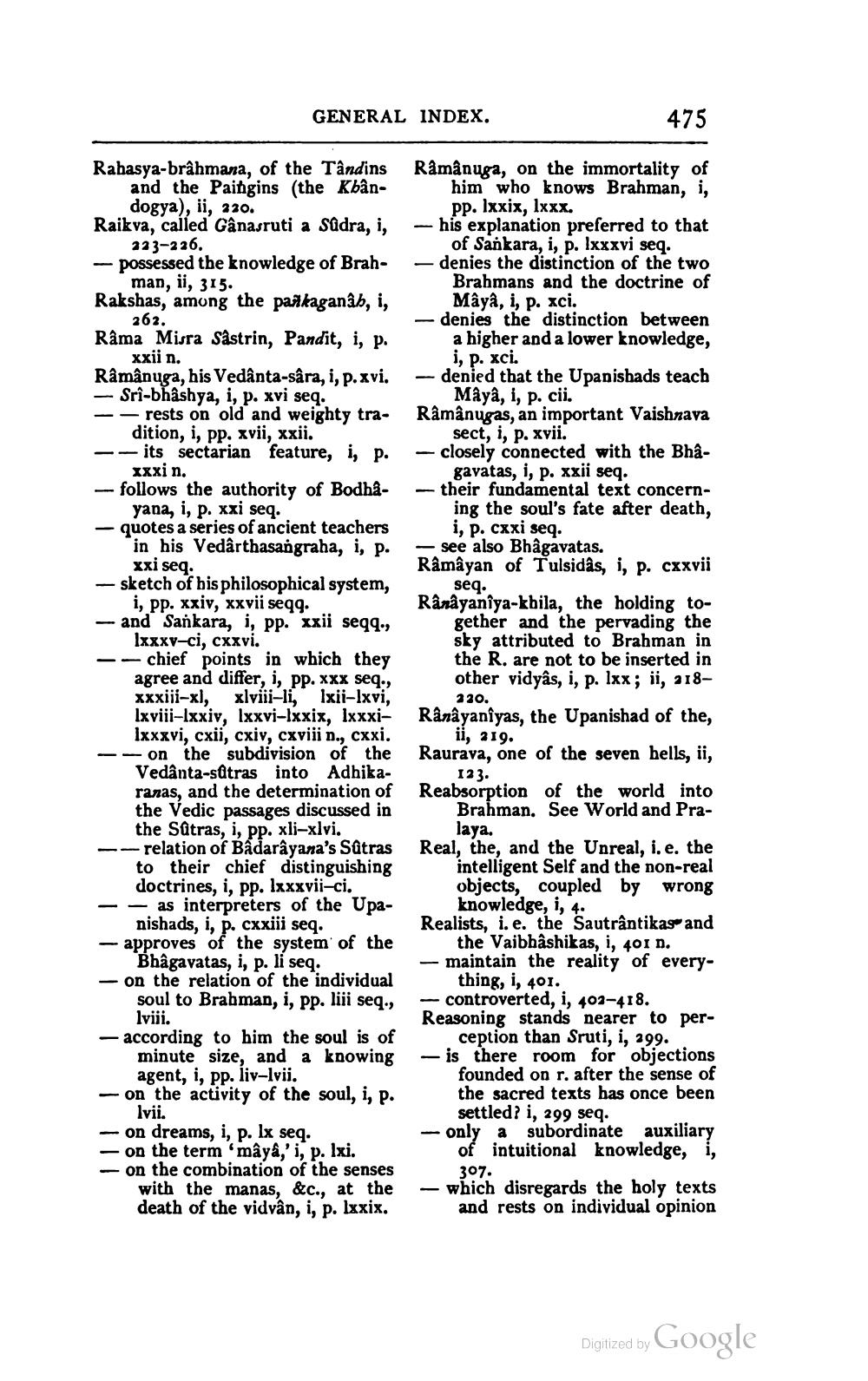________________
GENERAL INDEX.
Rahasya-brâhmana, of the Tândins and the Paingins (the Kbândogya), ii, 220. Raikva, called Gânasruti a Sûdra, i, 223-226. -possessed the knowledge of Brahman, ii, 315.
Rakshas, among the parkaganâb, i,
262.
Râma Mira Sâstrin, Pandit, i, P.
xxii n. Râmânuga, his Vedânta-sâra, i, p.xvi. Sri-bhâshya, i, p. xvi seq.
- rests on old and weighty tradition, i, pp. xvii, xxii.
its sectarian feature, i, p. xxxi n.
- follows the authority of Bodhâyana, i, p. xxi seq.
-quotes a series of ancient teachers in his Vedârthasangraha, i, p. xxi seq.
-sketch of his philosophical system, i, pp. xxiv, xxvii seqq. - and Sankara, i, pp. xxii seqq., lxxxv-ci, cxxvi. -chief points in which they agree and differ, i, pp. xxx seq., xxxiii-xl, xlviii-li, lxii-lxvi, Ixviii-lxxiv, lxxvi-lxxix, lxxxilxxxvi, cxii, cxiv, cxviii n., cxxi.
—on
the subdivision of the Vedanta-sutras into Adhikaranas, and the determination of the Vedic passages discussed in the Sutras, i, pp. xli-xlvi. --relation of Bâdarâyana's Sûtras to their chief distinguishing doctrines, i, pp. lxxxvii-ci.
as interpreters of the Upanishads, i, p. cxxiii seq. approves of the system of the Bhagavatas, i, p. li seq.
- on the relation of the individual soul to Brahman, i, pp. liii seq., lviii.
- according to him the soul is of minute size, and a knowing agent, i, pp. liv-lvii.
- on the activity of the soul, i, p. lvii.
-on dreams, i, p. lx seq. - on the term 'mâyâ,' i, p. lxi. - on the combination of the senses with the manas, &c., at the death of the vidvân, i, p. lxxix.
475
Râmânuga, on the immortality of him who knows Brahman, i, pp. lxxix, lxxx.
- his explanation preferred to that of Sankara, i, p. lxxxvi seq.
- denies the distinction of the two Brahmans and the doctrine of Mâyâ, i, p. xci.
- denies the distinction between a higher and a lower knowledge, i, p. xci.
1
denied that the Upanishads teach Mâyâ, i, p. cii. Râmânugas, an important Vaishnava sect, i, p. xvii.
closely connected with the Bhâgavatas, i, p. xxii seq.
- their fundamental text concerning the soul's fate after death, i, p. cxxi seq. -see also Bhagavatas. Râmâyan of Tulsidâs, i, p. cxxvii
seq. Râzâyanîya-kbila, the holding to
gether and the pervading the sky attributed to Brahman in the R. are not to be inserted in other vidyâs, i, p. lxx; ii, 218
-
1
230.
Râzâyanîyas, the Upanishad of the, ii, 219. Raurava, one of the seven hells, ii, 123.
Reabsorption of the world into Brahman. See World and Pralaya.
Real, the, and the Unreal, i. e. the intelligent Self and the non-real objects, coupled by wrong knowledge, i, 4.
Realists, i. e. the Sautrântikas and the Vaibhâshikas, i, 401 n. - maintain the reality of everything, i, 401.
controverted, i, 402-418. Reasoning stands nearer to perception than Sruti, i, 299. is there room for objections founded on r. after the sense of the sacred texts has once been settled? i, 299 seq. only a
subordinate auxiliary of intuitional knowledge, 307.
- which disregards the holy texts and rests on individual opinion
Google
Digitized by




